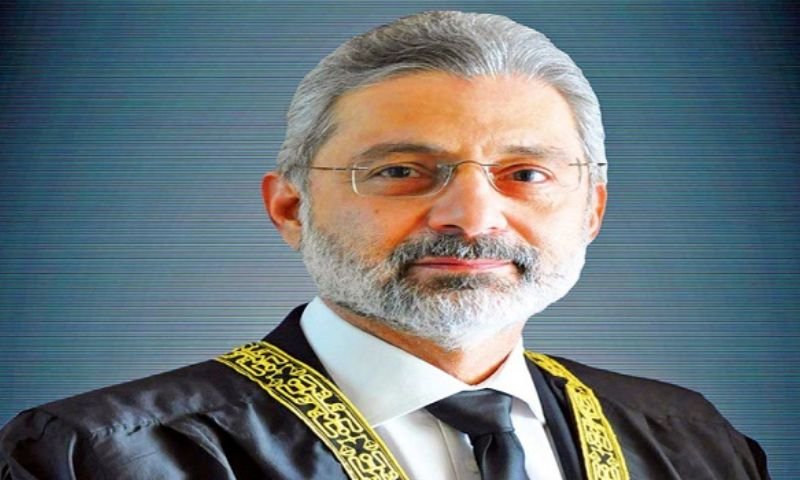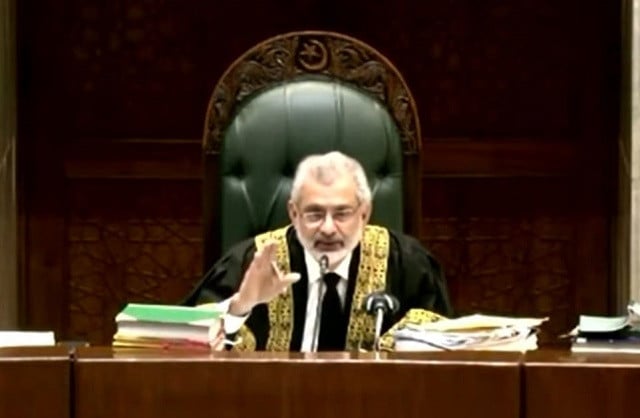ISLAMABAD: On Monday, Chief Justice of Pakistan Qazi Faez Isa remarked that Parliament’s SC (Practice and Procedure) Act 2023 did not intend to curtail the top judge’s authority by transferring suo motu powers to a three-member committee.
During a full court hearing on petitions challenging the SC (Practice and Procedure) Act 2023, the new Chief Justice of Pakistan (CJP) made remarks. The historic hearing, which lasted most of the day, adjourned until October 3. It was historic because, for the first time in Pakistan’s judicial history, the Supreme Court allowed live telecast of proceedings on petitions challenging the law regulating suo motu powers of the top judge.

CJP Isa announced that arguments in the case would start anew due to the formation of a new bench. Three applications for a full court had been approved.
The Attorney General for Pakistan submitted the government’s response, requesting the court to dismiss the petitions against the Supreme Court Practice and Procedure Act, arguing that petitions against parliamentary acts are inadmissible.
There were five cameras in the courtroom, four in the visitors’ gallery, and one for the lawyers’ rostrum. The newly-appointed Chief Justice, Qazi Faez Isa, constituted the full court.
Before the proceedings, the full court held a meeting to discuss live broadcasting and establish guidelines for effective case hearings. Justice Isa issued instructions for live broadcasting shortly after taking his oath as CJP.
CJP Isa, who arrived at the Supreme Court without protocol, emphasized treating visitors as guests and keeping the doors to justice open.
The hearing
At the hearing, the Chief Justice noted nine applications and asked Advocate Khawaja Tariq Rahim to begin his arguments.
The Chief Justice urged Rahim to focus on the law and not offer personal opinions.
During the proceedings, participants raised questions about the impact of the law on the Chief Justice’s powers and whether Parliament possessed the authority to enact it. Rahim agreed to respond to these questions later.
Do not want absolute powers: CJP
During the hearing, the CJP stated, “This court is funded by the people’s taxes.” He noted that if the law is struck down, the Chief Justice would benefit, but emphasized that judges take an oath to abide by the Constitution and the law.
He also mentioned that as the top judge, he did not seek absolute authority, citing a significant financial loss in the Reko Diq case and reiterating his commitment to upholding the law and Constitution.
‘Law not against SC’
After a short break, Attorney General Mansoor Usman Awan presented arguments in court, asserting that the petitions were inadmissible. He argued that the law focused on one office’s powers rather than the entire judiciary and aimed to enhance “democratic transparency.”
Awan contended that the law, contrary to the petitioners’ claims, served the public interest. He also emphasized that the Act did not restrict the institution’s power as a whole since it didn’t involve external checks or institutions.
Top court rules are there to guide us
During the hearing, CJP Isa questioned AGP Awan about following the 1980 SC Rules, highlighting that rules guide rather than limit.
Justice Akhtar pointed out that judges are not bound by the SC Rules, raising concerns about the challenged Act’s implications.
After a brief break, PTI’s lawyer Aziz Bhandari appeared, and CJP Isa inquired about his affiliation. The hearing will continue after the recess.
Justice Ahsan extended good wishes to the attorney general, who was leaving for the Indus Water Treaty case.
The fate of past verdicts if the Act remains intact was discussed, with the attorney general suggesting the “past and close transaction rule.”
The CJP inquired about the duration of arguments, and the hearing is expected to continue beyond the day. The stay order on the Act was extended, and written arguments are to be submitted by September 25, with the hearing adjourned until October 3. The full court lifted the stay order, and the CJP will form benches under the SC (Practice and Procedure) Act 2023.
Case background
On April 13, an eight-member Supreme Court bench halted the enforcement of a law aimed at regulating the Chief Justice’s suo moto powers in public interest matters.
In a previous June hearing, the similarities between the Supreme Court (Review of Judgments and Orders) Act 2023 and the SC Practice and Procedure Act were discussed. Attorney General for Pakistan, Mansoor Usman Awan, mentioned that Parliament could consider harmonizing the two laws.
The former CJP welcomed the idea but urged the government to involve the top court in any judiciary-related legislation.
The law
The law granted a three-member committee, including senior judges and the chief justice, the authority to initiate suo moto cases. Its aim was to ensure transparent proceedings in the apex court and provide the right to appeal.
Regarding the formation of benches, the Act stipulated that a committee consisting of the CJP and the two most senior judges would constitute benches. Decisions of the committee would be based on a majority vote.
For cases invoking Article 184(3), the Act mandated that they first go before the committee. When interpreting the Constitution, the committee would assemble a bench comprising no fewer than five apex court judges.
Appeals against verdicts from benches exercising Article 184(3) jurisdiction could be made to a larger SC bench within 30 days of the initial order. The appeal would be scheduled for a hearing within 14 days.
The right of appeal would also be retroactive, applying to cases decided under Article 184(3) before the Act’s commencement, provided the appeal was filed within 30 days of the Act taking effect.
The Act granted parties the freedom to select their counsel for filing review applications under Article 188 of the Constitution.
Additionally, it mandated that applications for urgency or interim relief in a case, appeal, or matter should be scheduled for a hearing within 14 days of filing.










